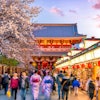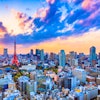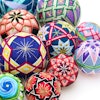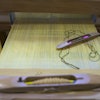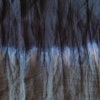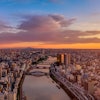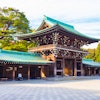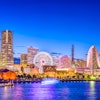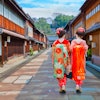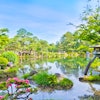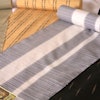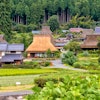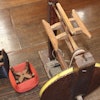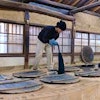Filter Holidays
Find your
next holiday
Filter
Holidays
Sign Up to Emails
Subscribe to our email newsletter and find out the latest news, updates and offers first!
Textiles of Japan
Holiday Overview
Join us on the trip of a lifetime and see the amazing textile delights of Japan together with visits to iconic shrines and gardens. Highlights of the tour include fabric shopping in Tokyo, historic Kanazawa, well known for its well-preserved Edo-era districts, exploring different fabric types including Murayama-oshima tsumugi, Ushikubi-tsumugi and nishijin-ori silks and Kurume kasuri cotton as well as different dyeing techniques including Kaga Yuzen, Kyo-Yuzen, and Arimatsu Narumi Shibori. Workshops with local experts really bring Japanese textiles and culture to life. We'll meet Rika Stein, Temari ball expert, Hiroyuki Shindo indigo dyer, and Shibori master Mr Hirose Murase. You will go home with amazing memories and experiences and hopefully fall in love with Japan like we have!
Itinerary
Please choose your preferred 14 day itinerary
Janice's project will be a unique reminder of this wonderful tour. As you travel through Japan on this fantastic textile journey, Janice would like you to collect small reminders of each place to compile a memory book! You can include tickets, scraps of fabric, and any other small mementos of your time in each place we stop or visit, you could even add little sketches or words to make a truly individual and personal book about your adventures!
Meet Janice Gunner and your tour manager at London Heathrow airport for your overnight flight to Tokyo. (Flight time: 14 hrs)
On arrival, we’ll be met by our English-speaking local guide and transfer to the hotel. Get to know your fellow travellers over the included dinner this evening.
Included Meals
- Dinner
Highlights
- Tokyo
Our full day in Tokyo begins with a visit to Meiji Jingu Shrine. Meiji Shrine is dedicated to the spirit of Emperor Meiji, the first Emperor of modern Japan, and his consort Empress Shoken and offers spacious grounds that are great for a relaxing stroll. Our crafting highlights today include some retail therapy at one of the city's many craft stores (all five floors of it!) and a workshop on dyeing a linen scarf with natural dyes with a local expert.
Included Meals
- Breakfast
Highlights
- Tokyo
- Workshop
- Meiji Jingu Shrine
We stay in Tokyo this morning, to visit Pigment Museum & Shop, before travelling south to Yokohama in the afternoon. Here we’ll visit the Silk Museum, which tells the story of the silk trade in Japan. Opened in 1959 to commemorate the centennial anniversary of the opening of the Port of Yokohama, we’ll see displays of silk Kimono and learn about the importance of Yokohama as a silk port.
Included Meals
- Breakfast
Highlights
- Pigment Museum & Shop
- Tokyo
- Yokohama and the Silk Museum
Our final day in Tokyo includes Akie Ginza Sashiko Museum & Shop, a museum dedicated to Murayama-oshima tsumugi silk and a Temari Ball workshop with Rika Stein, famous for her natural dyes from plants gathered around Japan. Temari balls are a craft which was introduced to Japan from China in the 7th Century. Historically, Temari were constructed from the remnants of old kimono and used as children’s toys. Pieces of silk fabric would be wadded up to form a ball, and then the wad would be wrapped with strips of fabric. As time passed, traditional Temari became an art, with the functional stitching becoming more decorative and detailed, until the balls displayed intricate embroidery.
With the introduction of rubber to Japan, the balls went from toys to art objects, although mothers still make them for their children. Temari became an art and craft of the Japanese upper class and aristocracy, and noble women competed in creating increasingly beautiful and intricate objects. Temari are highly valued and cherished gifts, symbolizing deep friendship and loyalty.
Included Meals
- Breakfast
Highlights
- Akie Ginza Sashiko Museum
- Temari Ball Workshop
The Yasue Gold Leaf Museum was founded in 1974 to preserve the legacy of gold beating and gold leaf craft for future generations. One of the world’s few museums dedicated to gold leaf, it introduces the gold beating process and related tools and exhibits fine art and craft works featuring gold and gold leaf. The museum is in the Higashiyama area of the city, which was home to Kanazawa’s gold beaters at the end of the Edo period (1607-1867) and many gold leaf businesses still operate here. We’ll end our day in Higashi Chaya district, a traditional neighbourhood with teahouses where geisha perform.
Included Meals
- Breakfast
Highlights
- Nagamachi
- The Yasue Gold Leaf Museum
- Kanazawa
Our full day in Kanazawa begins with a visit to Kenrokuen Garden, classified as one of Japan's three most beautiful landscape gardens. The spacious grounds used to be the outer garden of Kanazawa Castle and were constructed during the Edo period by the ruling Maeda family over a period of nearly two centuries. Opened to the public in 1871, Kenrokuen features a variety of flowering trees which provide the garden with a different look for each season.
We’ll also visit nearby Seisonkaku Villa, which was built in the last years of the Edo Period by a Maeda lord for his mother. It is one of the most elegant, remaining samurai villas in Japan. Ishikawa Prefectural Museum of Traditional Arts and Crafts displays 36 traditional crafts from the local area. Exhibits range from centuries-old fine art to modern pieces by local artisans. Informative displays introduce the processes behind Ishikawa’s most notable crafts.
Our final stop of the day is Kaga-yuzen Kimono Centre for a Yuzen dyeing experience. The history of Kaga Yuzen dyeing dates back 500 years, to when Umezome (plain dyeing) was the distinctive dyeing technique of the Kaga district. In the mid 17th century, pattern and picture dyeing were introduced to produce elegant designs, and those techniques evolved into today's Kaga Yuzen dyeing technique. In 1712, Yuzensai Miyazaki, a noted designer of fans, came to Kanazawa from Kyoto as a designer and dyer of the Tarodaya dyeing house. With his outstanding skill in dyeing using paste, he contributed greatly to the development of Kaga Yuzen dyeing. Kaga Yuzen dyeing flourished in Kanazawa under the patronage of the feudal lords of the Kaga district, and the city produced many outstanding dyers and designer.
Kaga Yuzen uses five basic colors; indigo, crimson, ocher, dark green and royal purple, and the designs depict beautiful elements of nature such as flowers, birds and landscapes. The dyeing style is characterised by the technique of shading from the outside to the inside of the patterns, and by realistic motifs such as plants and flowers with leaves bitten by insects. The fact that techniques such as gold-leaf application, tie-dyeing and embroidery are seldom used in Kaga Yuzen dyeing distinguishes it from Kyo-Yuzen dyeing which we’ll see later in the tour in Kyoto.
Included Meals
- Breakfast
Highlights
- Kaga-yuzen Kimono Centre
- Seisonkaku Villa
- Kenrokuen Garden
This morning we’ll travel to the traditional community of Shiramine in Ishikawa Prefecture’s second city, Hakusan (90 mins by coach). Ushikubi-tsumugi silk originates here and was recognised as a traditional craft in 1988. Some distinctive features of Ushikubi tsumugi silk are its manual production process and the use of rare silk threads from double cocoons that are made together by two silkworms. With traits like excellent durability, breathability, soft texture and a beautiful sheen, Ushikubi tsumugi fabric is used in indigo-dyed kimonos, ceremonial kimonos, sashes, and small accessories.
We’ll visit Hakusan Kobo weaving workshop and try our hand at weaving a coaster with an authentic handloom. We return to Kanazawa this afternoon to catch our train to Kyoto. (2 hrs 15 mins). Kyoto, once the capital of Japan, is a city on the island of Honshu.
Included Meals
- Breakfast
Highlights
- Hakusan Kobo Weaving Workshop
- Shiramine
Enjoy a day trip to Arimatsu on one of Japan’s famous bullet trains (90 mins). Arimatsu became famous and prosperous from around 1608 for its Arimatsu Narumi Shibori, an intricate, time consuming traditional tie-dyeing technique that leads to stunningly beautiful, complex patterns. The high-quality tie-dyed cloth became prized nationwide, particularly as large numbers of samurai, merchants, pilgrims and townsfolk passed through the dyeing and textiles village and purchased the dyed items as gifts and for personal use. Here we'll visit the museum dedicated to this technique and learn more about it during a workshop with a local expert.
Included Meals
- Breakfast
Highlights
- Arimatsu Narumi Shibori and Museum
- Workshop
This morning we visit the Kyoto Museum of Crafts and Design exhibiting materials, tools, videos and artisan demonstrations of more than 70 crafts from the Kyoto region.
In the afternoon, we take the short journey (90 mins) by coach to Miyama, famous for its traditional thatched roof buildings and, most notably, for being the home of Hiroyuki Shindo and The Little Indigo Museum. Here we’ll visit Hiroyuki’s indigo dye workshop as well as a gallery of his works and his collection of indigo textiles from around the world.
Included Meals
- Breakfast
Highlights
- Kyoto Museum of Crafts and Design
- Hiroyuki’s Indigo Dye Workshop
- Miyama
Our full day in Kyoto begins in the Nishijin district, notable for its textile production and is the birthplace of nishijin-ori, a high-quality, well-known silk brocade fabric, woven with colourful silk yarn and gilt or silver paper strips. Production of nishijin-ori, was designated a national traditional craft in 1976. We’ll visit the Nishijin Textile Centre, where we’ll learn all about the history, variety and making of nishijin-ori and take part in a weaving experience.
We’ll return to downtown Kyoto to visit Marumasu Nishimuraya, a shop located in a traditional Japanese machiya (classic wooden house), which specialises in Kyo-Yuzen dyeing, one of Kyoto’s traditional craft techniques. Here we’ll enjoy a Kyo-Yuzen dyeing experience. Kyo Yuzen was developed in Kyoto during the Edo period of the mid to late 17th century. Miyazaki Yuzensai, known for his exquisite drawings on folding fans, perfected a rice paste-dyeing method and from this sprung the Kyo Yuzen technique.
Kyo-Yuzen textiles are known for their vibrant colours and intricate designs showing nature, animals and mundane, everyday things. These beautiful hand painted fabrics are often used in Japanese kimonos. They involve an elaborate technique of painting dye directly onto a cloth and feature precise and thin lines as well as captivating colour gradients. What sets Kyo Yuzen apart from other textile dyeing methods is a process called the itome-nori, when the artist puts starch on the edges of the patterns so that the adjacent colors do not mix. This technique creates designs that look clean and crisp.
Included Meals
- Breakfast
Highlights
- Marumasu Nishimuraya
- Nishijin Textile Centre
We leave Kyoto today to travel to Hakata by train and then on to Fukuoka by coach (3 hrs total). Fukuoka, the sixth largest city in Japan, sits on the northern shore of Kyushu Island. On arrival we’ll enjoy some retail therapy at Shintencho shopping district, home to shops selling Japanese fabrics and handicrafts. We’ll end the day at Hakata Traditional Craft & Design Museum, which will introduce us to the traditional crafts from this region including Hakata Ori (woven textiles) and Hakata Ningyo (dolls).
Included Meals
- Breakfast
Highlights
- Fukuoka
- Hakata Traditional Craft & Design Museum
A day trip to Kurume today (1hr each way) which is home to Kurume Kasuri, an indigo-dyed cotton fabric that has been designated a National Important Intangible Asset and a National Traditional Craft Product. Kurume Kasuri originated in the latter part of the 18th century, and some local shops still make the fabric using traditional methods. We’ll enjoy a workshop with local dyeing expert, Yamaai.
We continue to Yame (30 mins) to visit Yame Dento Kogeikan Museum & Shop which showcases traditional crafts from this area of Japan and works to pass on these traditional skills and promote local artisans.
Included Meals
- Breakfast
Highlights
- Yame Dento Kogeikan Museum & Shop
- Kurume
Transfer to Fukuoka airport for our flight home to the UK (via Tokyo).
Included Meals
- Breakfast
You will need to have a good level of fitness to get the most out of this holiday. We therefore do not recommend this tour for anyone with mobility problems. The itinerary involves a significant amount of walking whilst sightseeing each day, sometimes in warm temperatures and often on rough ground and including steps. Whilst sightseeing is taken at a leisurely pace, for the enjoyment of everyone in the group you should be able to keep up with your fellow travellers.
Accommodation
You will stay for four nights at Prince Hotel Shinigawa, Tokyo, two
nights at Kanazawa Tokyu Hotel, Kanazawa, four nights at Miyako Hotel Kyoto
Hachijo, Kyoto, and two nights at The Royal Park, Fukuoka.


